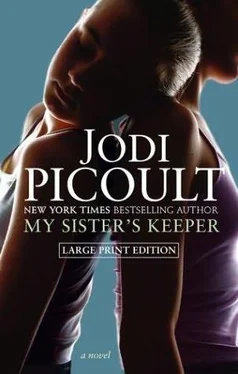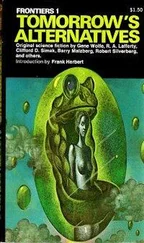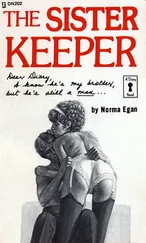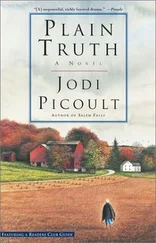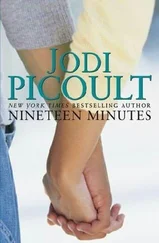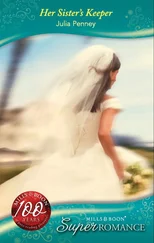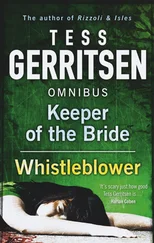She is not the foe I've built her up to be. For one thing, Anna's mother is shorter than I am, and slighter. She has dark hair and haunted eyes and is pacing. The moment it creaks open, she runs to Anna. "For God's sake," she cries, shaking her daughter by the shoulders, "where have you been? Do you have any idea—"
"Excuse me, Mrs. Fitzgerald. I'd like to introduce myself." I step forward, extending my hand. "I'm Julia Romano, the guardian ad litem appointed by the court."
She slides her arm around Anna, a stiff show of tenderness. "Thank you for bringing Anna home. I'm sure you have lots to discuss with her, but right now—"
"Actually, I was hoping I could speak to you. I've been asked by the court to present my findings in less than a week, so if you've got a few minutes—"
"I don't," Sara says abruptly. "Now isn't really a good time. My other daughter has just been readmitted to the hospital." She looks at Anna, still standing in the doorway of the kitchen: / hope you're happy.
"I'm sorry to hear that."
"I am too." Sara clears her throat. "I appreciate you coming by to talk to Anna. And I know you're just doing your job. But this is all going to work itself out, really. It's a misunderstanding. I'm sure Judge DeSalvo will be telling you that in a day or so."
She takes a step backward, challenging me—and Anna—to say otherwise. I glance at Anna, who catches my eye and shakes her head almost imperceptibly, a plea to just let this go for now. Who is she protecting—her mother, or herself? A red flag unravels across my mind: Anna is thirteen. Anna lives with her mother. Anna's mother is opposing counsel. How can Anna possibly live in the same home and not be swayed by Sara Fitzgerald?
"Anna, I'll call you tomorrow." Then without saying good-bye to Sara Fitzgerald, I leave her house, headed for the one place on earth I never wanted to go.
The law offices of Campbell Alexander look exactly the way I've pictured them: at the top of a building cast in black glass, at the end of a hallway lined with a Persian runner, through two heavy mahogany doors that keep out the riffraff. Sitting at the massive receptionist's desk is a girl with porcelain features and a telephone earpiece hidden under the mane of her hair. I ignore her and walk toward the only closed door. "Hey!" she yells. "You can't go in there!"
"He'll be expecting me," I say.
Campbell doesn't look up from whatever he's writing with great fury. His shirtsleeves are rolled up to the elbow. He needs a haircut. "Kerri," he says, "see if you can find some Jenny Jones transcript about identical twins who don't know that they—"
"Hello, Campbell."
First, he stops writing. Then he lifts his head. "Julia." He gets to his feet, a schoolboy caught in an indecent act.
I step inside and close the door behind me. "I'm the guardian ad litem assigned to Anna Fitzgerald's case."
A dog that I haven't noticed till now takes its place by Campbell's side. "I'd heard that you went to law school."
Harvard. On full scholarship.
"Providence is a pretty tight place… I kept expecting…" His voice trails off, and he shakes his head. "Well, I thought for sure we'd run into each other before now."
He smiles at me, and I suddenly am seventeen again—the year I realized love doesn't follow the rules, the year I understood that nothing is worth having so much as something unattainable. "It's not all that hard to avoid someone, when you want to," I answer coolly. "You of all people should know."
I'M REMARKABLY CALM, really, until the principal of Ponaganset High School starts to give me a telephone lecture on political correctness. "For God's sake," he sputters. "What kind of message does it send when a group of Native American students names their intramural basketball league The Whiteys?"
"I imagine it sends the same message that you did when you picked the Chieftains as your school mascot."
"We've been the Ponaganset Chieftains since 1970," the principal argues.
"Yes, and they've been members of the Narragansett tribe since they were born."
"It's derogatory. And politically incorrect."
"Unfortunately," I point out, "you can't sue a person for political incorrectness, or clearly you would have been handed a summons years ago. However, on the flip side, the Constitution does protect various individual rights to Americans, including Native Americans—one for assembly, and one for free speech, which suggest that the Whiteys would be granted permission to convene even if your ridiculous threat of a lawsuit managed to make its way to court. For that matter, you may want to consider a class action against humanity in general, since surely you'd also like to stifle the inherent racism implicit in the White House, the White Mountains, and the White Pages." There is dead silence on the other end of the phone. "Shall I assume, then, that I can tell my client you don't plan to litigate afterall'"
After he hangs up on me, I push the intercom button. "Kerri, call Ernie Fishkiller, and tell him he's got nothing to worry about."
As I settle down to the mountain of work on my desk, Judge lets out a sigh. He's asleep, curled like a braided rug to the left of my desk. His paw twitches.
That's the life, she said to me, as we watched a puppy chase its own tail. That's what I want to be next.
I had laughed. You would wind up as a cat, I told her. They don't need anyone else.
I need you, she replied.
Well, I said. Maybe I'll come back as catnip.
I press my thumbs into the balls of my eyes. Clearly I am not getting enough sleep; first there was that moment at the coffee shop, now this. I scowl at Judge, as if it is his fault, and then focus my attention on some notes I've made on a legal pad. New client—a drug dealer caught by the prosecution on videotape. There's no way out of a conviction on this one, unless the guy has an identical twin his mother kept secret.
Which, come to think of it…
The door opens, and without glancing up I fire a directive at Kerri. "See if you can find some Jenny Jones transcript about identical twins who don't know that they—"Hello, Campbell."
I am going crazy; I am definitely going crazy. Because not five feet away from me is Julia Romano, whom I have not seen in fifteen years. Her hair is longer now, and fine lines bracket her mouth, parentheses around a lifetime of words I was not around to hear. "Julia," I manage.
She closes the door, and at the sound, Judge jumps to his feet. "I'm the guardian ad litem assigned to Anna Fitzgerald's case," she says.
"Providence is a pretty tight place … I kept expecting… Well, I thought for sure we'd run into each other before now."
"It's not all that hard to avoid someone, when you want to," she answers. "You of all people should know." Then, all of a sudden, the anger seems to steam out of her. "I'm sorry. That was totally uncalled for."
"It's been a long time," I reply, when what I really want to do is ask her what she's been doing for the past fifteen years. If she still drinks tea with milk and lemon. If she's happy. "Your hair isn't pink anymore," I say, because I am an idiot.
"No, it's not," she replies. "Is that a problem?"
I shrug. "It's just. Well…" Where are words, when you need them? "I liked the pink," I confess.
"It tends to take away from my authority in a courtroom," Julia admits.
This makes me smile. "Since when do you care what people think of you?"
She doesn't respond, but something changes. The temperature of the room, or maybe the wall that comes up in her eyes. "Maybe instead of dragging up the past, we should talk about Anna," she suggests diplomatically.
I nod. But it feels like we are sitting on the tight bench of a bus with a stranger between us, one that neither of us is willing to admit to or mention, and so we find ourselves talking around him and through him and sneaking glances when the other one isn't looking. How am I supposed to think about Anna Fitzgerald when I'm wondering whether Julia has ever woken up in someone's arms and for just a moment, before the sleep cleared from her mind, thought maybe it was me?
Читать дальше
